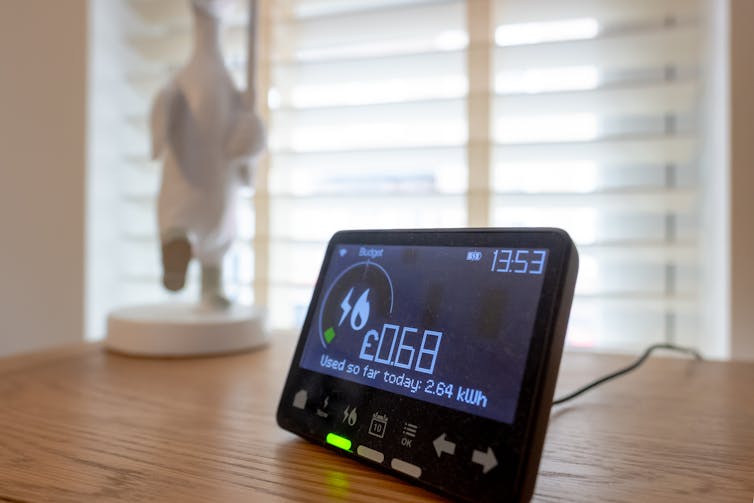You don’t have to look very hard at the moment to find evidence of the immense financial pressure on UK households. New figures from the Trussell Trust show that 1.5 million emergency food parcels were provided to people between April and September 2023.
The Joseph Rowntree Foundation’s latest report on destitution in the UK shows that around 3.8 million people in 2022 were not able to meet their basic physical needs – staying warm, dry, clean and fed – more than double the amount in 2017.
And the UN’s special rapporteur on extreme poverty and human rights, Olivier De Schutter, has accused the UK government of failing to provide a welfare system that ensures an adequate standard of living for everyone.
But what does it mean to have an adequate standard of living?
For the last 15 years, we have been researching this exact topic, trying to identify what kind of living standards we as a society agree everyone should be able to achieve. We call this the Minimum Income Standard (MIS).
Unlike poverty measures, which focus on what people lack, either in terms of income or material goods, MIS establishes what is needed to reach a defined living standard, and how these needs can be met.
A minimum standard of living
We’ve talked to hundreds of groups of people from different backgrounds and types of households, to determine a minimum standard of living that includes more than just food, clothes and shelter.
This minimum is about having what you need in order to have the opportunities and choices necessary to participate in society. As a participant early in our research said: “Food, clothes and shelter keep you alive, but that’s not living”.
Living with dignity is about more than just survival, it’s about being able to participate in the world around you. MIS describes in detail what households require to meet material and non-material needs, establishing baskets of goods and services that combine to provide an adequate living standard.
From these baskets, we calculate how much different households need to spend to reach this level, and the income required to enable this spending.
In 2023, we have calculated that a single person needs to earn £29,500 to have an acceptable standard of living, up from £25,000 in 2022. A couple with two children need to earn £50,000, compared to £44,500 in 2022.
Our latest analysis shows that 19.2 million people (29% of the population) in the UK are living in households bringing in below the minimum standard, and don’t have the income they need.
This is the result of the significant pressures on household incomes and inflation, particularly for food and domestic fuel.
And while costs have increased rapidly, people’s incomes, both in and out of work, have not kept up. A single person, out of work, receives only 30% of what they need to reach MIS.
Even working full-time at the national living wage they only have 73% of what they need, falling well short of an adequate living standard. As of April 2023, the total annual salary for working full-time (37.5 hours a week) at the national living wage is £20,375.
A couple with two children, receiving out-of-work benefits, have half of what they need, and with both working full-time at the national living wage, they still fall short of MIS, having 95% of what they need to have an acceptable standard of living.

Fuel prices have been one driver of the higher cost of living. Nick Beer/shutterstock
What the government should do to fix it
The government’s recently announced legislative plans provided very little, if anything, to support those most at risk of living below – and far below – a minimum adequate standard of living. Addressing this substantial challenge is critical to the nation’s economy and health, as well as people’s dignity and human rights.
Over the last ten years, benefits have been increased inconsistently, and overall have not kept pace with the rising cost of living. With the upcoming autumn statement, the government has a chance to commit to uprating benefits in line with inflation. This would remove uncertainty for people who receive benefits, and improve the state safety net.
The government must also remove the two-child limit, which stops families from receiving additional support for their third or subsequent children. In April 2023, 1.5 million children lived in families affected by this limit, missing out on up to £3,235 each year.
Child Poverty Action Group estimates that removing this limit would lift around a quarter of a million children out of poverty. Neither the current government or the opposition have outlined plans to do this.
We also need longer-term thinking and bolder ambition, focused on creating a society in which fewer people fall below the MIS. We need a social security system that doesn’t depend on food banks and charities to catch those falling though the growing holes in our safety net, and a benefits system that guarantees a minimum income for all – rooted in robust research and evidence.
We need proper, long-term investment in housing, and we need to find ways of reducing the cost – and improving the quality – of key services like transport and childcare. Until we do this, many people will continue to exist on incomes that don’t meet their minimum needs.



 Yes, government influences wages – but not just in the way you might think
Yes, government influences wages – but not just in the way you might think  The American mass exodus to Canada amid Trump 2.0 has yet to materialize
The American mass exodus to Canada amid Trump 2.0 has yet to materialize  Locked up then locked out: how NZ’s bank rules make life for ex-prisoners even harder
Locked up then locked out: how NZ’s bank rules make life for ex-prisoners even harder  Every generation thinks they had it the toughest, but for Gen Z, they’re probably right
Every generation thinks they had it the toughest, but for Gen Z, they’re probably right  Office design isn’t keeping up with post-COVID work styles - here’s what workers really want
Office design isn’t keeping up with post-COVID work styles - here’s what workers really want  Parents abused by their children often suffer in silence – specialist therapy is helping them find a voice
Parents abused by their children often suffer in silence – specialist therapy is helping them find a voice  The Beauty Beneath the Expressway: A Journey from Self to Service
The Beauty Beneath the Expressway: A Journey from Self to Service  Why have so few atrocities ever been recognised as genocide?
Why have so few atrocities ever been recognised as genocide?  Disaster or digital spectacle? The dangers of using floods to create social media content
Disaster or digital spectacle? The dangers of using floods to create social media content  The ghost of Robodebt – Federal Court rules billions of dollars in welfare debts must be recalculated
The ghost of Robodebt – Federal Court rules billions of dollars in welfare debts must be recalculated  How to support someone who is grieving: five research-backed strategies
How to support someone who is grieving: five research-backed strategies  Why financial hardship is more likely if you’re disabled or sick
Why financial hardship is more likely if you’re disabled or sick  Youth are charting new freshwater futures by learning from the water on the water
Youth are charting new freshwater futures by learning from the water on the water  Can your cat recognise you by scent? New study shows it’s likely
Can your cat recognise you by scent? New study shows it’s likely 

































